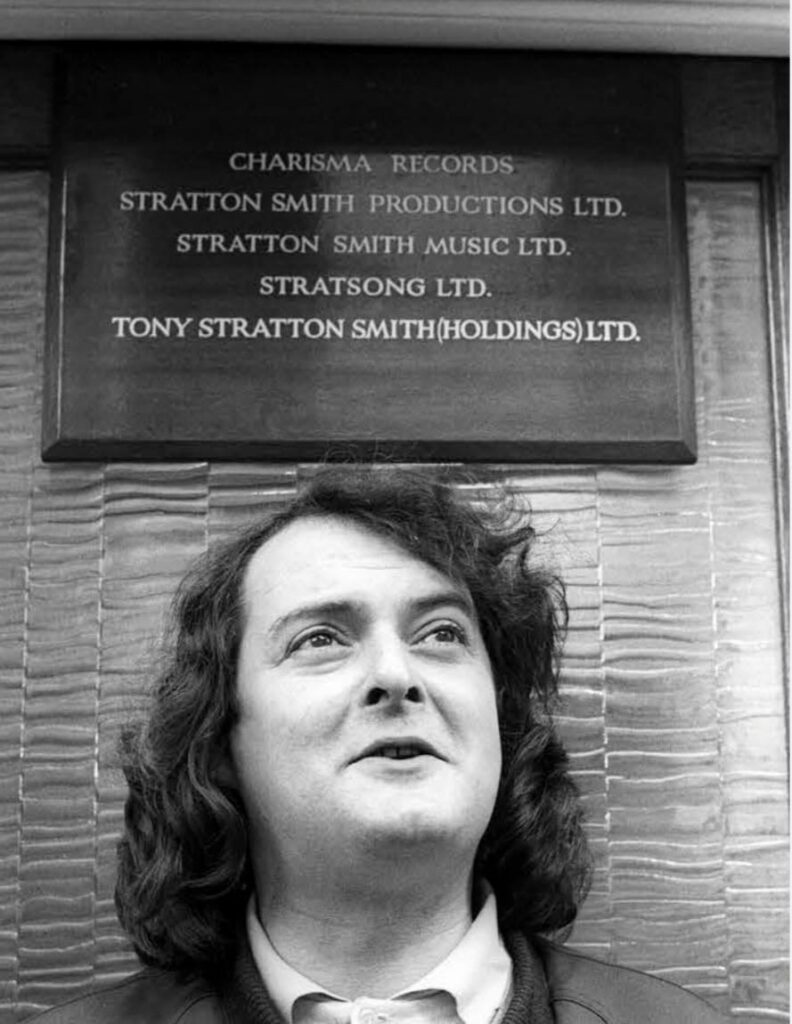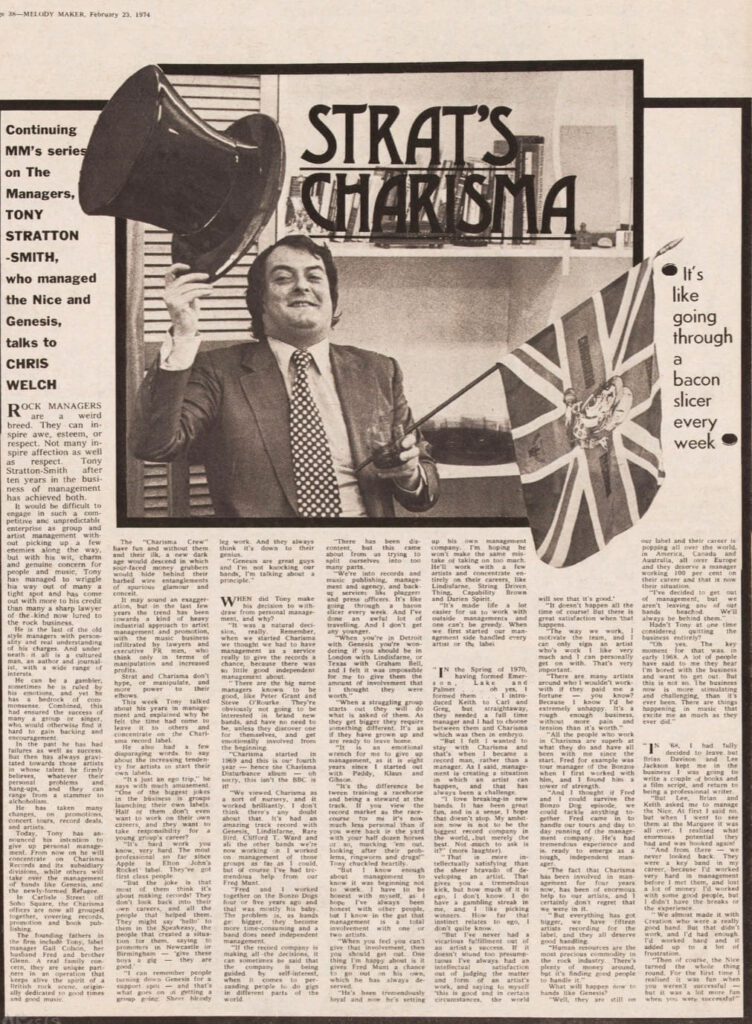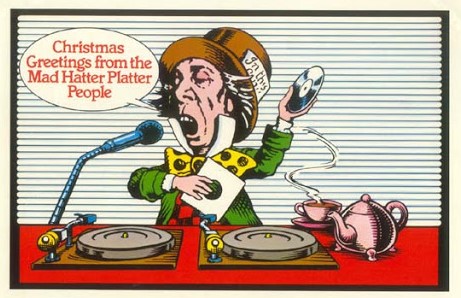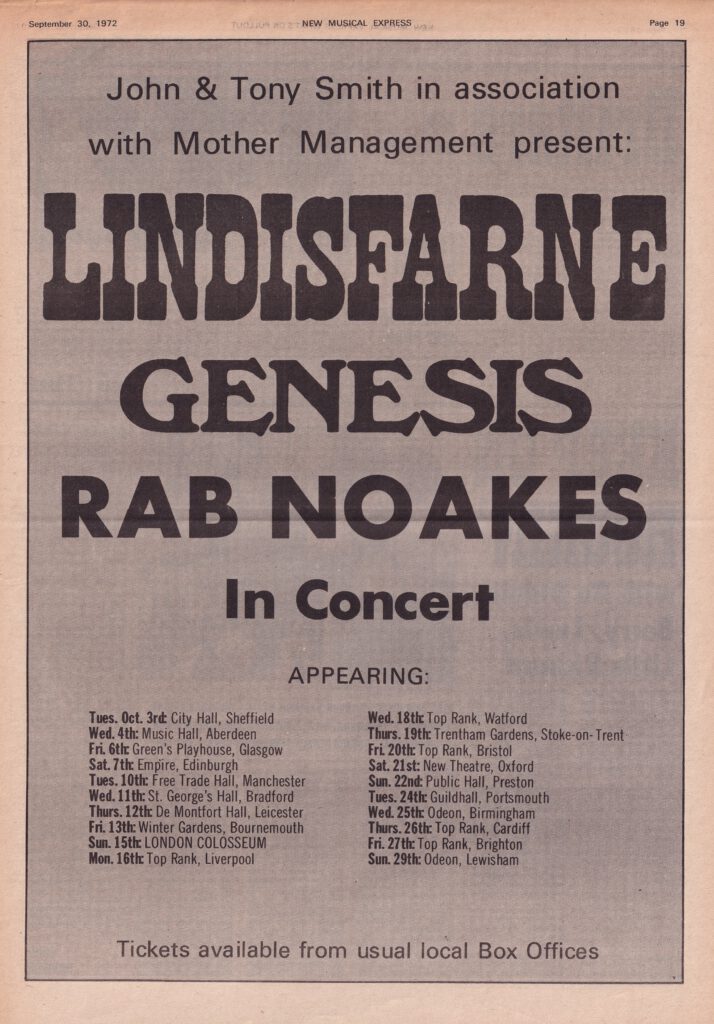
THE FAMOUS CHARISMA LABEL
Tony Stratton Smith: A Mad Hatter in Wonderland
by MGS & ahand83
Being a teenager in Britain in the 60’s must have been exciting. Movements of young people emerged from the grounds and a new – political, spiritual and fashionable – awareness started to take shape. Hippies expressed themselves through clothing, experimentation with drugs and above all… music! Men let their hair grow long and girls took off their clothes when the situation called for it. So when Genesis caught their first few bras on stage in 1987, they probably lingered back to their time at boarding school, aged 15, when the 60’s were in full swing.
There they were; Peter Gabriel, Anthony Banks, Michael Rutherford, Anthony Phillips and Chris Stewart, imprisoned at Charterhouse, a public school in Godalming just a couple of miles outside of London. Charterhouse wasn’t the place to rebel your way through, so what can one do? Starting a band and handing over a tape of demos to a Mr. King seemed a good idea. Young pupils at Charterhouse were bullied by senior students and bashed by their headmasters, but our group of friends never gave way and were determined when it concerned their musical ambitions. The rest of the story is a history well known to men.

What Jonathan King and therefore Decca couldn’t provide for Genesis – artistic freedom, some time and a small salary – was something another person could. Tony Stratton Smith had an absolute faith in young experimental musicians who took a different approach to their art. Strat, as he was called in society circles, was a respected sports journalist with connections in the music business. He often frequented the music clubs of London including the Speakeasy, Ronnie Scott’s and The Marquee Club, the latter stating on it’s website that “Tony Stratton Smith was indeed one of the most influential and relevant figures in the history of the club. He would recommend new artists and very often provided new talents to the club’s program.”[1] Obviously Genesis was one of those bands. They played several gigs at The Marquee between February 1970 until November 1972.
In the late 60’s managing a record label was seen as no different from, say, a vacuum cleaner company.[2] Strat was ambitious as he was reckless and had a different way of doing things than old and grey cigar smoking company executives. He was frustrated by the incompetence of record labels and the lack of deserved attention to the artists. That’s why he founded The Famous Charisma Label in 1968, a little later simply called Charisma.

Strat started the label together with his secretary Gail Colson who later on became the label manager. She worked for Charisma until 1978 and managed Peter Gabriel after his departure from Genesis amongst others. Colson played an important part in establishing Charisma and she was a solid foundation Strat could rely on. Her own story can be found in the Genesis biography ‘Chapter & Verse’ from 2007. According to Colson Strat was the one who came up with the name Charisma. She tells that nobody knew what Charisma meant at that time and that they had to explain the name to the English music press. Charisma came from the Greek verb ‘charizesthai’ (to favor, gift) and in Christian context it meant something like to give off light.[3] He couldn’t have chosen a better name for that matter, considering the years to come with names like The Nice, Genesis, Van Der Graaf Generator, Monty Python, Julian Lennon (son of John Lennon and his first wife Cynthia, signed to Charisma in 1983) and the likes of Brand X.
According to Colson did Strat not only live and breathe the bands he signed, but he spend all his money on them, even so that he was broke from time to time. Strat was well known for his love of gambling and horse racing, sponsoring horse races on occasions. Starting Charisma was just another form of gambling. He also was a heavy drinker and he had all kinds of people screaming at him to get out of bed or whatever. But Strat did what he wanted. “Charisma was really a one man show”, says Colson in an interview with Mojo. “Strat signed all the bands and he wanted one of everything. He wanted a classical band, a jazz band, a rock band, which used to confuse the shit out of everybody that worked with him.”[4]

The iconic Mad Hatter label logo – taken from the original drawing by John Tenniel, an old chap known for his illustrations for the classic ‘Alice’s Adventures In Wonderland’ – was an outstanding work of art by Paul Whitehead and became the unmistakable emblem for the label. Whitehead also produced the iconic covers for the first three Genesis albums of which the originals were stolen from the Charisma vaults when it was sold to Richard Branson’s Virgin Records in 1985. God knows where they are now.
The first release on the label was 1969’s ‘Sympathy’ by Rare Bird, which became an international hit. The single did very well in Italy and France and sold over more than a million copies worldwide. Since it’s release the song’s been covered by several artists including Toyah, Marillion and Faithless.
Tony Stratton Smith first heard about Genesis in early 1970 through Rare Bird’s Graham Field. He tried tracking them down, got Peter Gabriel on the phone and went to see them at the upstairs room of Ronnie Scott’s. Genesis so knocked him out that Strat had a deal with them before the night was out.[5]

Genesis had the privilege of writing their second album Trespass in a private cottage in Wotton, Surrey, owned by the parents of Richard Macphail, a fellow student and friend from Charterhouse who would later become their all-round manager. Now with a record deal at Charisma under their belt, again they were in the privileged position to write new material for their third album, which was to become ‘Nursery Cryme’, at Luxford House, a 16th century mansion in the countryside near Crowborough, East Sussex. The building was let to Tony Stratton Smith and he generously offered it to the bands he supported.
One of Strat’s greatest innovations in the music business were the showcase tours (the so-called ‘Six Bob Tours’) where he put 3 or more Charisma bands on one bill for a very reasonable price. So it came that Genesis toured with Lindisfarne and Rab Noakes on their 1972 Foxtrot tour, two acts that had nothing to do with experimental progressive rock but who were on the payroll of Charisma. Rab Noakes was a Scottish singer-songwriter who died just recently (November 2022) after serving a lifetime to folk music. On the second leg of the tour in 1973 they were supported by a Scottish folk rock band called String Driven Thing who also were in the grace of Tony Stratton Smith.
Charisma kept Strat busy for more than 15 years and in 1985 he decided that enough was enough. He sold his label to Virgin and became involved in several film projects. Eventually he moved to the Spanish island of Las Palmas. During a trip to Jersey in 1987 he became ill and sadly died on March 19th at the age of only 53. It’s most likely that pancreatic cancer was the cause of his early death. A memorial service was held for Strat at St Martin-in-the-Fields, a church in the City of Westminster, London. At the memorial service Keith Emerson (from Emerson, Lake & Palmer) played ‘Lament for Tony Stratton Smith’, a fitting tribute.
The ultimate tribute was the release of ‘The Famous Charisma Box’ in 1993 which featured tracks from all the bands Strat supported during his life. Another compilation on CD was released in 2009 called ‘Refugees – A Charisma Records Anthology 1969-1978’. Genesis had a lot of sympathy for Strat and owed him a great deal considering they nearly bankrupted the company. Mike Rutherford told Mojo in 2001: “It was a nice label and they supported us. Strat was a really important part of our lives. You’d always come away from a meeting with him feeling that there was hope after all. He was very much a good viber, which we needed at the time we signed.”[6] Jack Barrie, manager of The Marquee once described Strat as generous romantic. “A romantic because he made dreams come true – generous because they were always other people’s dreams.”[7] Genesis paid their respects to Strat in their 1987 Invisible Touch Tour program, shortly after his sudden death. With a dedication of their own they stated that without Strat they would probably not have been here today. “As founder and driving force behind Charisma Records in the 70’s he gave all of us on the label his untiring energy and experience but more importantly, besides being ‘Record Company Boss’ he was first of all, our friend.”[8]
[1],[7] The Marquee Club, no date [2],[4],[6] Mojo, 2001 [3] Genesis: Chapter & Verse, 2007 [5] Trouser Press, 2020 [8] Genesis: The Invisible Touch Tour Program, 1987
















